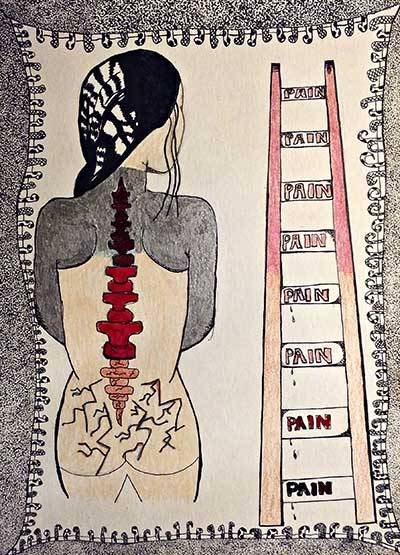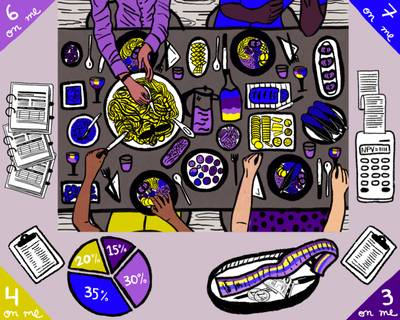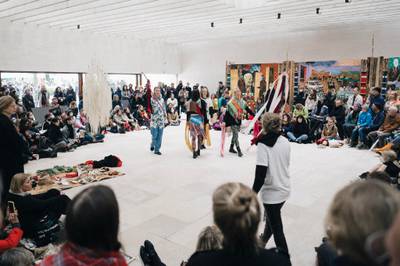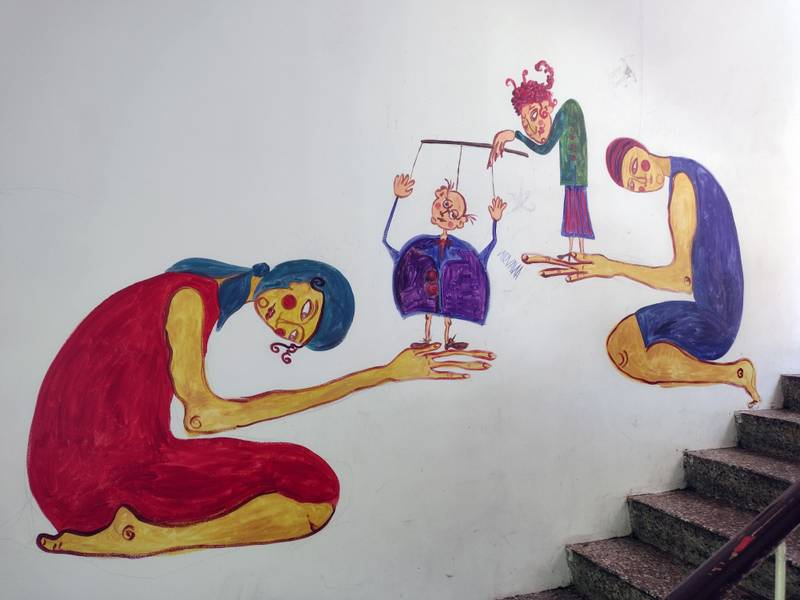

Painting at the Emergency Accommodation Center Alppikulma, Helsinki. Artist: Elviira Davidow
Ioana Țîștea is a PhD researcher at Tampere University, Faculty of Education and Culture. She is finalising her doctoral thesis, Creolizing the epistemologies and methodologies of Nordic migration research: Autoethnographic↔Reflexive↔Collaborative Stories and Entanglements.
Decolonial feminist María Lugones proposes world travelling1 as a strategy to reject the fragmentation of our subjectivities and worlds into pure parts and to work against issues of domination and subalternity even as we find that we have them internalized. For my doctoral thesis, I, a non-Roma Romanian migrant woman, collaborated with Romanian Roma women living in Finland by travelling to each other’s worlds and understanding the inter-relational and corresponding character of our complex beings while also making visible and challenging issues of domination and subalternity. I considered Romani storytelling practices to constitute methodologies while considering the stories shared with me by the Roma women to constitute alternative knowledges that carve out space within Finnish migration research for previously invisible, ignored or misrecognized realities. I tried to put into practice Trinh T. Minh-ha’s call2 to dissolve divisions between literature/fiction/stories/‘lies’ and academic-writing/facts/history/‘truth’, and thus between the researcher and the storyteller. The Roma women’s stories thus provide explanatory theoretical narratives and not just raw material. Their relational, dynamic, vernacular viewpoints and modes of representation theorize social phenomena in and of themselves.
Conversations Between Creative Writing, Romani Storytelling, and World-Travelling
Writing is not just a lonesome act of inscribing words on paper or in a computer document. It can be a collaborative act of mutual reflexivity, storytelling, and questioning one’s ‘authorial’ voice. Research can further entail imagining and practicing new ways of co-researching and co-authoring with participants who become co-researchers and co-authors. When collaborating in research from unequal power positions, it is important to consider power asymmetries and plural, divergent agencies, treating each other as co-creators of knowledge and challenging research hierarchies without erasing power differences. Such methods require engaging with unlearning habituated modes of domination-dependency and learning how to listen to each other with care and critical engagement. But even when trying to cross historical and current structural divides, these habituated modes of domination-dependency can continue to shape and influence interactions and conversations. They cannot be done away with through research collaborations or friendships. They must be challenged through conscious choices of doing things otherwise, even without knowing the potential results.
Beyond hegemonic societal discourses and official history, Roma people have preserved their counter-discourses and counter-histories through storytelling. Unlike “His-story,” which tells us the events from a specific time and place, a story tells us the possibilities of what might happen at unspecified times and places. Stories transmitted by Roma people via generations in various forms and channels—spoken, written, sung, cooked, drawn, and sculpted—build alternative Romani histories that pluralize hegemonic history. Following Trinh T. Minh-ha, who writes about women of colour’s writing and storytelling practices, Roma women’s memories and stories can similarly be counted among the world’s earliest archives or libraries, which transmit marginalized knowledges from generation to generation, from mouth to ear, body to body, hand to hand3. Their stories burn, wound, destroy, and bring dis-ease as easily as they bring into life, nurture, lighten, soothe, and heal, thus blurring the line between life and death, good and evil, and showing how destruction and creation are one collective process of healing. Storytelling combines writing, speaking, and listening into a multi-sensory speech that can be imagined, seen, heard, smelled, tasted, and touched.
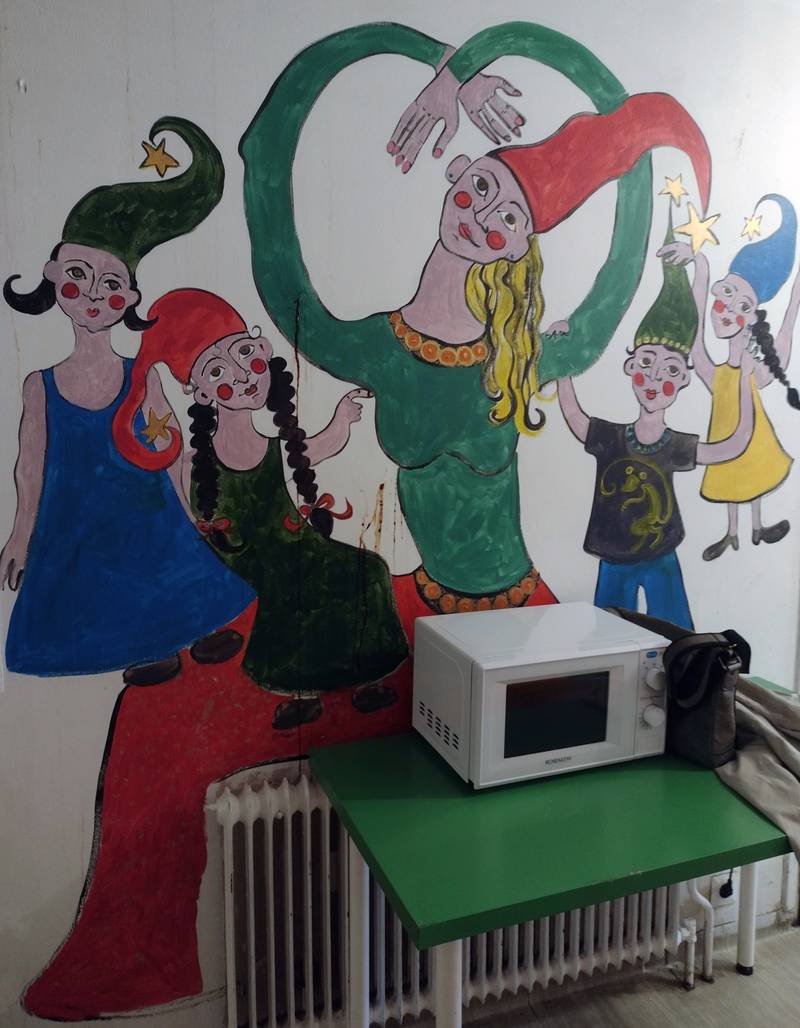

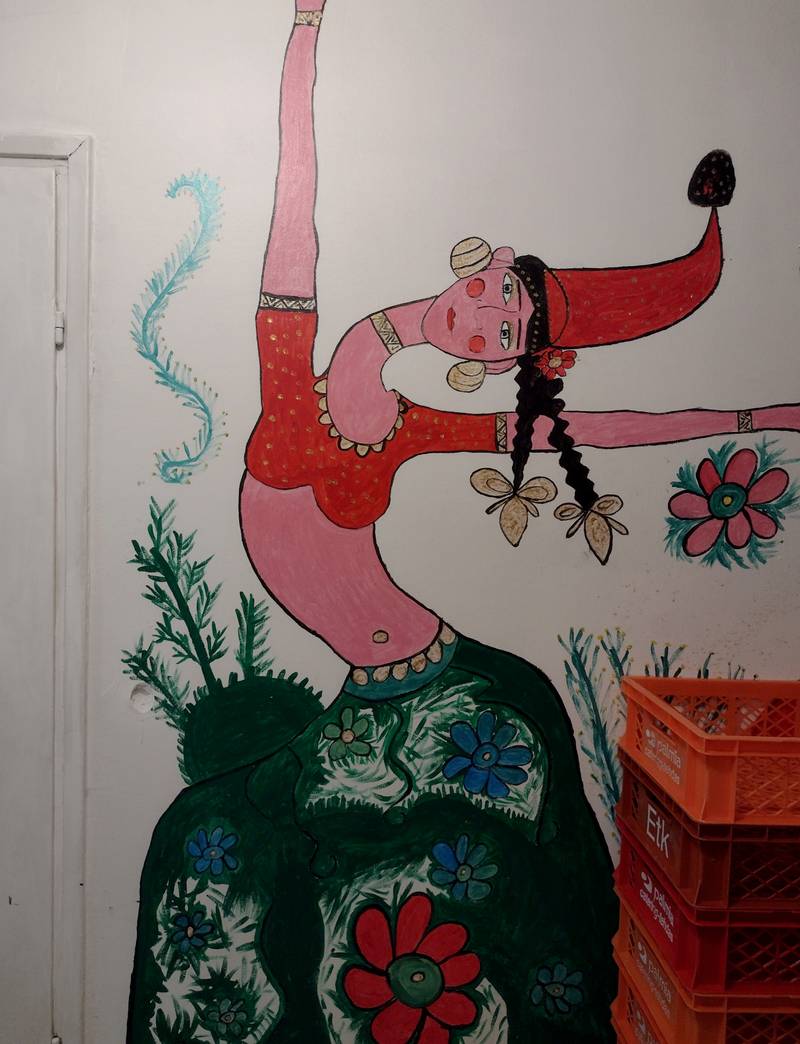

Painting, Emergency Accommodation Center Alppikulma, Helsinki, Elviira Davidow, 2021
As María Lugones writes, we can inhabit multiple worlds simultaneously, and we may disagree/agree with how we are perceived in those different worlds. However, we may also internalize and animate arrogant perceptions4 that we disagree with. Women in privileged positions learn to abuse women on the margins without feeling bad because they have an arrogant view of them. Women perceived as arrogant internalize that perception and project it onto similarly situated women. With Gabriela Băncuță, the main co-researcher in my thesis and co-author for one of the thesis publications, Creolizing subjectivities and relationalities within Roma-gadje research collaborations, we contested the boundaries between us and our worlds5. In 2020, I was invited to interview 15 Romanian Roma women living in Helsinki for a research project exploring intersectional discriminations experienced by Roma women. Gabriela was one of the interviewed women. In 2021, we were both offered jobs within another project where we worked together for one year. Roma women with little or no formal schooling—including Gabriela—was assigned to do cleaning work; Romanian and Bulgarian women from privileged social positions—including Ioana—were hired as translators and mediators; and white Finnish women ran and sponsored the project or promoted its cleaning services to potential clients. Finnish women also constituted the majority on the decision-making board. None of the Roma women was part of the board. The project thus reproduced racialized, gendered, and classed hierarchies, with Gabriela at the bottom and Ioana in the middle of the hierarchy.
We contested those boundaries by sharing stories through speaking, listening, recording, transcribing, reading, and editing, and embodied mutual meditations with all the senses. Sometimes it did not require speaking, but seeing and listening to the stories emerging from silences, meditating on them, seeing them take shapes and shape-shifting, smelling, tasting, touching them, and finally translating them into words. The boundaries between writing, speaking, and silently feeling and sensing became blurred. Gabriela and I engaged in mutual self-reflection, identification, understanding, and self-aware experimentation, by looking at ourselves in each other’s mirrors and back in our own, seeing with each other’s eyes how we are constructed in each other’s worlds, blurring and confusing social classifications, unlearning arrogant perceptions, learning to become full subjects in each other’s eyes, creatively defying norms that subdue us or that teach us to subdue each other, and revealing the process of producing hierarchical order when we cannot help not reproducing it. We entered the contestation of boundaries and hierarchies between Roma and non-Roma worlds from different positions that condition the kinds of interventions possible for each of us. Through our stories, we take responsibility for our different roles in maintaining/contesting the boundaries between us and their structural hierarchies. Nevertheless, we subtly shape the ongoing contestation of meanings and boundaries and change how they condition our different agencies, shifting the geographies of what is possible for each of us without erasing our differences.
In many of the initial drafts for our co-authored publication, we focused more on Gabriela’s life story and her migration experiences, with myself as a guide in contextualizing those stories socio-historically and geopolitically, critically reflecting on them and presenting them to an academic audience. With time, we both unlearned the researcher-participant positionalities in which participants reveal themselves, and researchers translate those experiences for an academic audience. I gradually learned how also to reveal myself to Gabriela, and our stories became more entangled and interdependent without subsuming Gabriela’s experiences within my narrative. Rather, Gabriela mainly dictated the narrative, and Gabriela’s thoughts and ideas triggered my stories. Not all stories made it into the final text. We had to be selective to protect each other’s privacy and that of the people in our lives. Overall, we tried to put into practice egalitarian strategies for research collaborations while accounting for the potential failures in enacting a true egalitarian collaboration and for the impossibility of transcending power relations. To do so, we applied what Chela Sandoval calls “middle voice reflexivity,” which is at once productive of an effect on an object and constitutive of a particular kind of agent…by means of an action6. In other words, it is a reflexivity that ongoingly reinvents itself as it reinvents the agent toward emancipating the imagination. With our reflexive middle voices, Gabriela and I moved within and between the past, present, and future, active and passive, to recreate our subjectivities as we intervened in our interconnected yet distinct social realities in an ongoing loop of mutual transformation. We further reflected on the spatiality and historicity of our different journeys to our research collaboration while reflecting on how those journeys intersect and how to go beyond oppressor/victim binaries, particularly given our different positions as Romanian migrant women and co-authors, Gabriela being Roma, working as a cleaner, and not being affiliated with any university, and myself being non-Roma and having a double role as mediator between Roma cleaners and Finnish clients in the project that employed Gabriela as well as a PhD researcher. From negotiating those tensions in our collaboration, we imagined new relationalities between Roma and non-Roma.
Gabriela’s Reflexive Middle Voice
With a reflexive middle voice, Gabriela told multidimensional and complex stories about her life while utilizing a plurality of strategies from varying standpoints tactically employed for addressing various subjugations. At times she presented herself as virtuous and innocent; at other times, she transpired resistance, subversiveness, creativity, and humour; in some instances, she denoted impressive strength and resilience; in certain moments, she was interested in collective transformations for Roma emancipation. As shown in our stories below, she adopted different tactics for navigating different worlds. Some of her strategies, particularly the resistant ones, may not have been visible to an ignorant perceiver’s eyes, such as the artist in the story below titled My mother makes the best polenta in the world, or me in the following story titled Loud Silence. Following María Lugones7, the subversiveness of women of colour does not make sense in a world marked by wilful white and epistemic ignorance. Her different tactics may also be interpreted as disloyal to the different worlds she inhabits, as in betraying a certain imagined authenticity of what it may mean to be Roma. Such a perception would see her subjectivity as fragmented, fragmentation which could be used for purposes of social control. Gabriela, however, creatively defied norms that subdue her, thus asserting her multiple states toward becoming ambiguous, unclassifiable, and unmanageable.
My mother makes the best polenta in the world
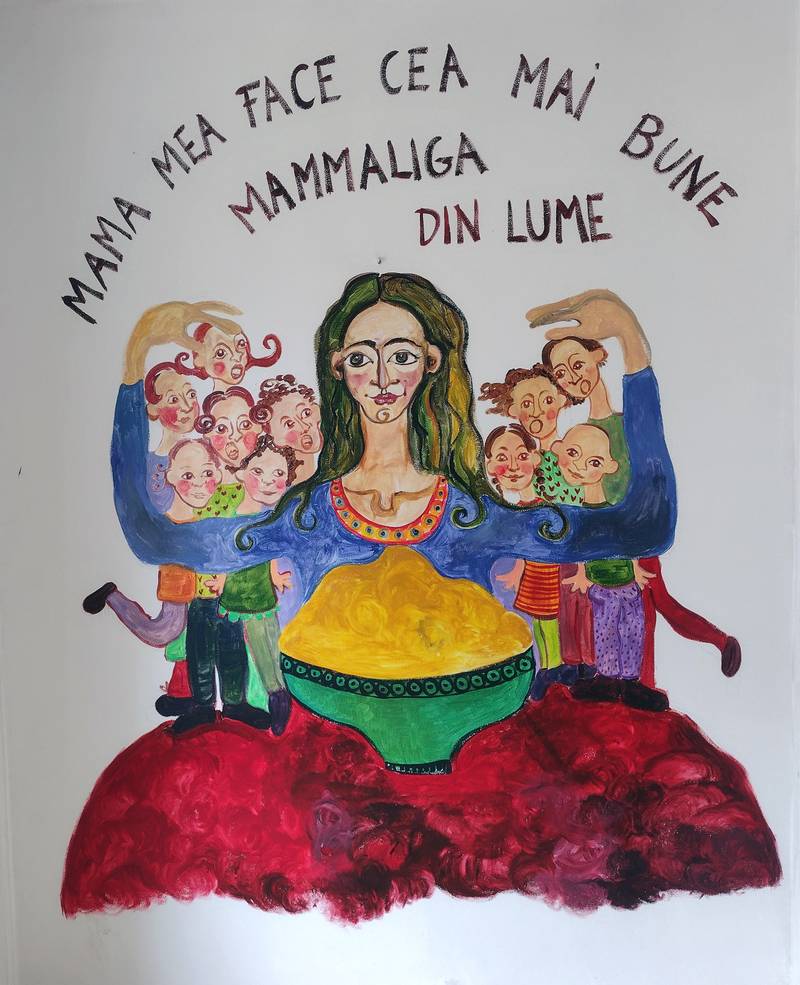

My mother makes the best polenta in the world, photo taken by Gabriela with her phone
GABRIELA: My mother made food in a big cauldron, delicious stews with meat and vegetables served with polenta made from corn flour. She used the vegetables she planted in our garden and the animals she raised in our yard. She raised pigs and chickens, and in the garden, she planted onions, potatoes, tomatoes, carrots, and everything we needed. Us children helped her out with the work around the house. We were seven children—four girls and three boys. Sometimes our mother brought the cauldron in front of the house, on the street, for people to eat together, and we all sat together like that, adults and children, and ate, talked, and played. A Finnish artist who came to paint the walls of the social8 a few years ago turned my story into this painting. But she only painted the polenta. And the text she wrote above the painting says, ‘My mother makes the best polenta in the world’. I laughed when I saw that. How can all of us be satisfied with just polenta? My mother also cooked meat and vegetables to go with it. But I told the artist that she did a good job.
Loud Silence
IOANA: As Gabriela and I talk one evening in my studio over a glass of wine, I recount: ‘You know what the guy leading the social told me today? That I should be more authoritative with you. That when I come to work, you must fear me. That I should not be your friend because you’ll get lazy.’
G: Did you talk about this with your boss?
I: No, but I told my Finnish co-worker. She said, ‘Jesus! He NEVER does that with me! He does it depending on your cultural background, given you’re both from the Balkans. He’s an important client for our project with Roma cleaners, but that doesn’t mean he can be disrespectful to you.’
G: Gadje9 have this habit of making everything about themselves. I nod disapprovingly at Ioana’s story and tell her, ‘That’s bad. He should not tell you how to do your job.’ I know that’s what she wants to hear. But what about how that gadjo called us Roma workers lazy? Why didn’t they put their indignation there, also? Anyway… I started browsing the pages of a magazine I used to sell on the streets of Helsinki before working as a cleaner. ‘They wrote a story about me in Finnish. From an interview I gave them many months ago. They also printed my photo, look. Tell me what it says.’
I: They wrote you’re homeless and begging on the streets of Helsinki to send money to your children back in Romania. They tell readers to donate money to some NGO to help vulnerable Roma.
G: Really? That’s all they wrote from everything I told them? That’s what they used my photo for? To make people pity me?
I: Did they tell you they would use your photo and story to raise money?
G: Yes, but I thought they would tell a better story. I told them so many things… You know I love to tell stories.
I: ‘These stories we tell each other… We could write something together. And have both our names on it.’ I suggest timidly. Gabriela gazes out the window in silence as if contemplating what I just said.
G: Gadje has this habit of making everything about themselves. Still, what Ioana says sounds good, but I don’t want to tell her that. I want to leave something behind for my children to one day read and be proud of. But I want to do this on my terms, so I need to test her first …
I: After a while, Gabriela turns to me, looking deep into my eyes as if trying to read my thoughts. Then she changes the topic of the conversation.
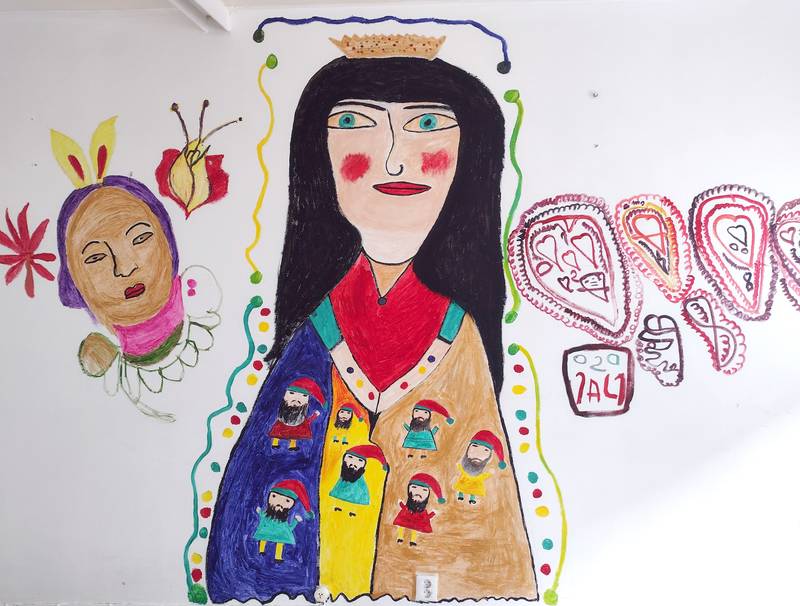

Painting, Emergency Accommodation Center Alppikulma, Helsinki. Artist: Elena Dima, 2021
Dream Big
I: As I’m walking down the street with music in my headphones and confidence rushing through my body on my way to meet Gabriela on a warm spring day, I notice Gabriela sitting by the road, not exactly at the meeting spot we had agreed on. Gabriela observes me walking in her direction, with what I perceive as suspicion or mistrust. Seeing myself through her scrutinizing eyes, I feel shaken by this image. I take off my headphones and sit next to Gabriela, asking her how she is, with some reticence.
G: I’m tired and stressed. Some other women at work keep harassing me, telling me my work is no good, that I’ll never clean as well as them, and that I should stay in my place and not dream big. They think you’re giving them fewer hours because of hiring me.
I: But I’ve assured them so often that I divide the work hours fairly.
G: How are they supposed to believe you’re fair when they notice you spend time with me outside work? They think I also decide on how the work hours are divided. They say that’s unfair because they’ve worked here longer than me. Organize a meeting with everyone. They’ll calm down after they’ve been heard.
I: You’re right. I’ll send a message to the group chat straight away.
G: Tell your boss to make a new rule in the next board meeting. When we clean, we should stop working in pairs. We should take one floor each and work independently. That way, they will not have time to harass me. Tell your boss this will improve the quality of cleaning and reduce the number of complaints from clients.
I: In a racial capitalist system that denies her board membership, I used my voice to initiate a board decision. I will say what Gabriela asked me to in the next board meeting. The board members agree to implement the proposal.
My Reflexive Middle Voice
With a reflexive middle voice, I scrutinized my complicity with the power structures regulating Gabriela’s life. Even though it’s important for Roma women to have access to the same systems and opportunities as other women, it’s important to look out for any paternalism that might show up in our work together. A well-intended, privileged non-Roma Romanian migrant woman ‘helped’ a migrant Roma woman with no formal education who was street vending on the streets of Helsinki to raise her three children living back in Romania. The non-Roma woman even convinced the Roma woman to write together a research paper about their experiences of working together and their friendship. This paper will help the former earn a PhD. She thought the research collaboration would be egalitarian if the Roma woman were a co-author. To avoid being tokenised, the two authors tried to blur divides and hierarchies between them while acknowledging the impossibility of fully diminishing those divides by keeping the tensions and disagreements between them as generative sources of knowledge in the text. They tried to practice egalitarian ways of working together, each leading different parts of the process and consulting each other at every step. Still, instead of imagining a new world, the process risked taking them to the Roma woman being co-opted in the non-Roma world and, in that process, the Roma woman learning how to self-govern herself according to the norms of that world. That is because, despite our best intentions, we could not sometimes overcome the oppressor/oppressed, perpetrator/victim, saviour/saved binaries, and colonising narratives of me empowering Gabriela in my terms, even if we intended the opposite. Perhaps the problem was us intending the opposite, which still relies on the same, although inverted, categories, which simply turn Gabriela into a self-governing subject liberating herself in the coloniser’s terms, and me into an accomplice who incorporates Gabriela’s success story into existing power structures. We, therefore, need to invent new categories to imagine new worlds that go beyond the narrative of empowerment which reproduces paternalism and structural and epistemic violence. Or do we need to follow the lead of those Roma thinkers and artists, such as Mihaela Drăgan and Ioanida Costache, who have already imagined future worlds in which Roma life doesn’t just survive but actually flourishes10?
Toward Imagining New Worlds
As Ioanida Costache describes the artistic practice of Mihaela Drăgan–Roma actress, playwright, and cofounder of Roma feminist theatre collective Giuvlipen, what is needed is a decolonizing move of ‘world-shattering’ that rejects the status quo, but also goes beyond critique in forging a new, be it imagined, world of liberation for the Roma.11 Mihaela Drăgan imagines this new world by staging via theatre and films her vision of Roma Futurism, a time-space where historical, spiritual knowledges, witchcraft, and alternative healing merge with new technologies to forge futuristic utopias that reimagine and reconfigure social hierarchies of oppression.12 As Ioanida Costache further writes, by re-appropriating Roma stereotypes like witchcraft and using it as a political tool to reconfigure social divides and hierarchies, Roma Futurism turns its back to empty human rights discourses and to the prescriptive abjection and victimhood of oppression, and instead draws on markedly Romani epistemologies to create new images, new symbols, new myths.13
Why have Gabriela and I not enacted similar expressions of a new world in our collaboration? Although we also argue for multiple belongings to multiple worlds and for bringing them into dialogue to contest the fragmentation within and between ourselves, we seem to have only remained at the level of critiquing our current worlds. Perhaps before embarking on this journey toward a new, yet unknown, world, Gabriela should also have access to my resources, such as access to higher education that opens myriad opportunities. Before Gabriela can reject empty human rights discourses of surviving and flourishing, structural societal changes need to be made concerning the redistribution of resources to descendants of Roma people who have historically endured slavery and genocide.14 This historical legacy affects many generations and brings about high discrepancies in the resources afforded to Roma and non-Roma. Moreover, it would be a gesture of appropriation and colonization for me to imagine a new world of liberation for the Roma from my privileged non-Roma position. I can and have tried to imagine a new world in which non-Roma researchers bring collaborations with Roma participants to the next level by co-creating new methodologies emerging from Gabriela’s vernacular knowledges, viewpoints, and initiatives.
Such collaborations can open research to plural knowers, knowledges, and ways of knowing. Institutions thus stand to gain social and racial capital and good assessments of diversity and inclusion practices. But what do the co-researchers gain? It could be self-representation, control over the research process, recognition through authorship or official presentations, monetary compensation, learning new skills, or learning about and entering new worlds. Still, who decides on the terms and potential gains of co-researching? Can such collaborations be truly reciprocal? It is important to stay with the fruitful tensions that these questions generate and how they open research to unforeseeable, unexpected outcomes. It is also critical not to romanticize research collaborations based on unequal power dynamics and always to keep visible and challenge issues like appropriation, dominance, and dependency while imagining possibilities for mutually transformative research methods and inter-human and beyond-human relationships across differences.
